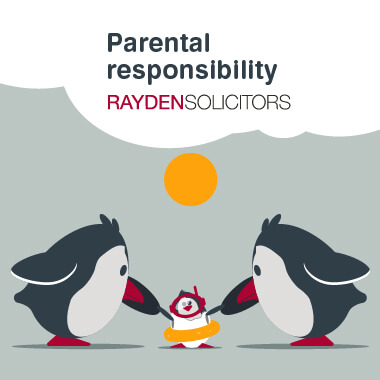

Parental disputes
Although most people will try to avoid disagreements over the future arrangements for their children, it is not always possible to do so.
At Rayden Solicitors, we believe that a parent or carer who knows where they stand in the eyes of the law is best placed to reach an early and sensible compromise to the dispute before them.
Rayden Solicitors can advise in relation to all disputes about children whether the problem is financial or practical (such as where a child will live or go to school). We are able to help with sensitive issues such as paternity and to arrange emergency intervention in possible cases of abduction.
Rayden Solicitors understand how difficult disputes about children can be and will give practical advice helping you to resolve the situation. We are experienced in every stage of the process; from initial negotiations and meetings through to the preparation of court proceedings, obtaining expert evidence and preparing for final hearings.
We are also experts in Alternative Dispute Resolution. Emily Watson, a partner of the firm, is a children arbitrator and will be able to arbitrate children disputes successfully for you. Che Meakins, a Legal Director at Rayden, is an experienced family law solicitor and a qualified mediator.
Rayden Solicitors do not undertake public law children work.
What is a parental responsibility agreement?
Parental responsibility means the legal rights, duties, powers, responsibilities and authority that a parent has in respect of a child ie. the right to be involved in the decision making regarding the child.
A mother automatically has parental responsibility of the child. A father will automatically have parental responsibility of the child if he is married to the mother when the child is born. Unmarried fathers will have parental responsibility in respect of the child if their name is on the child’s birth certificate after 1 December 2003.
If a father does not have parental responsibility, he can acquire it by entering into a parental responsibility agreement with the mother and filing this with the court, or he can apply to the court for a parental responsibility order.
Step parents can obtain parental responsibility if they are married to the mother or they are a civil partner of a parent who holds parental responsibility in respect of the child and they either:
- Enter into a parental responsibility agreement with the parents who hold parental responsibility in respect of the child and file the agreement with the court; or
- Apply to the court for a parental responsibility order.
Parental responsibility can also be acquired by individuals who are not the child’s parent by obtaining a “lives with order” from the court in respect of the child or by adopting the child or becoming the child’s legal guardian.
If you have any questions about parental right, what it is and who has it, contact our expert parental responsibility solicitors for advice.
Residence and contact
Often when parties separate, disputes arise regarding the children, such as where the child shall live and how much contact they should have with the non-resident parent.
If the parents do not agree with where the child shall live or how much time the child will spend with each parent, either party can apply to the court for a child arrangements order under the Children Act 1989.
If the issue in dispute is where the child shall live, then the application to the court should be for a “lives with order” (previously known as a residence order) and if the dispute is in respect of how much time the child should spend with the non-resident parent, then the application to the court is for a “spends time with order” (previously known as contact).
A “spends time with order” can include direct contact, supervised/supported contact and indirect contact such as letters/FaceTime.
Rayden Solicitors can offer specialist advice and guidance in relation to all residence and contact disputes.
Specific issue order
Disputes may arise between the parents on specific issues such as what school the child should attend, what medical treatment they receive, what name the child should be known by or any aspect in connection with parental responsibility for a child. Before such decisions are made the parent making the decision must obtain the consent of all those who hold parental responsibility in respect of the child.
If an agreement cannot be reached, then an application can be made to the court by either parent for a specific issue order to determine the particular issue in dispute.
Prohibited steps order
If one parent becomes aware that the other parent intends to take steps which they do not agree with in relation to the child, they can apply to the court for a prohibited steps order.
Examples of when this may arise include changes in the child’s schooling, the child being known by any other name or when one parent believes the child is at risk of harm and they apply to the court for an order preventing the other parent from removing the child from their care. Prohibited Steps Orders can also be effective when one parent suspects the other parent intends to take the children out of the jurisdiction of England and Wales without their consent.
Temporary removal from the jurisdiction of England and Wales
If there are no court orders in place in respect of the child, then either parent wanting to take the child on holiday outside the jurisdiction of England and Wales will need to seek the agreement of all parties who hold parental responsibility in respect of the child.
If a parent who has parental responsibility unreasonably refuses to allow the other parent to take the child out of England and Wales on a temporary basis such as for a holiday, an application can be made to the court to seek permission to take the child away.
If a parent has a “lives with order” in respect of the child, then they can take the child out of the jurisdiction of England and Wales for a month without the requirement of obtaining the consent of all those who hold parental responsibility, however it is still good practice to inform those who hold parental responsibility in respect of the child about the holiday.
Permanent relocation
When parties separate it is commonplace for their circumstances to change. It may be that the primary carer of the child wishes to relocate to within this jurisdiction, return to their home country or is offered a job in a different country. In such circumstances the primary carer of the child will need the consent of all individuals who hold parental responsibility in respect of the child. If the non-resident parent does not consent to such a move, an application can be made to the court for permission to permanently move the child to a different country.
When considering all of the above applications, the court’s most important consideration will be the child’s welfare. The court will also take into consideration the following factors when considering any application:
- The ascertainable wishes and feelings of the child concerned (considered in the light of his age and understanding)
- The child’s physical, emotional and educational needs
- The likely effect on the child due to any change in his circumstances
- The child’s age, sex, background and any characteristics of his which the court considers relevant
- Any harm which the child has suffered or is at risk of suffering
- How capable each of the child’s parents are, and any other person the court considers the question to be relevant
- The range of powers available to the court under this Act regarding the proceedings in question
These factors are set out in the Children Act 1989.
Permanent relocations, whether overseas or internal, can be complex and it is important to take the correct approach from the start. The team at Rayden Solicitors can guide you through the process to achieve the best outcome for you.
Rayden Solicitors is also committed to equality and diversity and in doing so supports and advises all members of our community.
High quality work and a team focus. This is a happy and committed team with intellect and pragmatism a key strength at all levels. They are not afraid to explore all the options for their clients and readily grapple with all the issues in a case from all angles to achieve the best results for their clients. They are not averse to creative solutions – in short they are first class lawyers.
Legal 500
Parental Rights and Responsibility FAQs
Who has parental rights?
The legal concept which encompasses parental rights is Parental Responsibility. Parental Responsibility is defined in the Children Act 1989 as “all of the rights, duties, powers, responsibilities and authorities which by law a parent of a child has in relation to the child and his property” Birth mothers automatically have Parental Responsibility, whereas fathers do if they were married to the mother when the child was born, or the child was born after 1 December 2003 and they are named on the birth certificate. Unmarried fathers can also acquire Parental Responsibility via a Parental Responsibility Agreement or a Court Order.
What does parental responsibility mean?
People with Parental Responsibility can make or be involved in the important decisions in a child’s life including where a child should live, education (choice of school; everyone with Parental Responsibility should have the right to see school reports in most cases); health and medical treatment, changing a child’s name, religious upbringing, and decisions to take the child abroad (on holiday or to relocate).
There is a presumption in the Children Act which provides, unless the contrary is shown, the involvement of both parents in the life of the child concerned will further the child’s welfare. This covers child access/ custody /contact arrangements (now “spends time with Orders”).
When does a father lose parental rights?
Parental rights can only be lost in exceptional circumstances where the mother of the child applies for a court order. This tends only to be in cases such as violent crimes or serious treatment or neglect.
Contact us for expert advice
If you would like to arrange a first meeting or have any questions, please contact us or fill in the enquiry form below.
"*" indicates required fields













